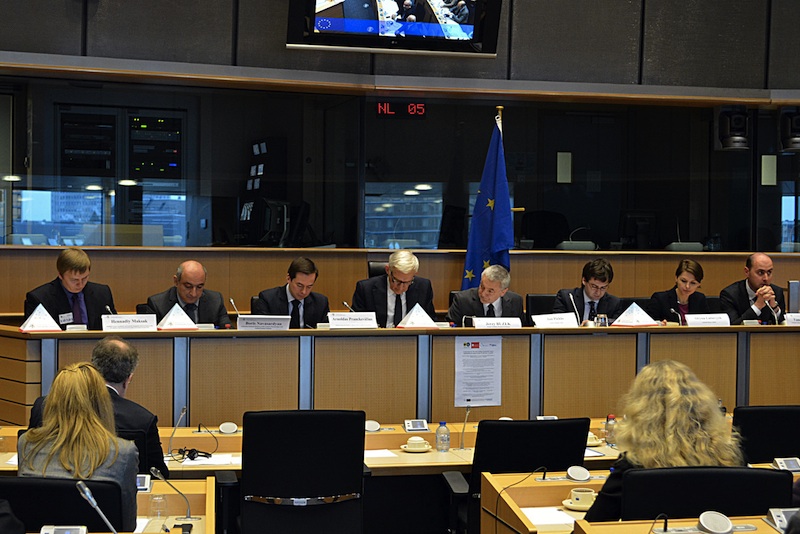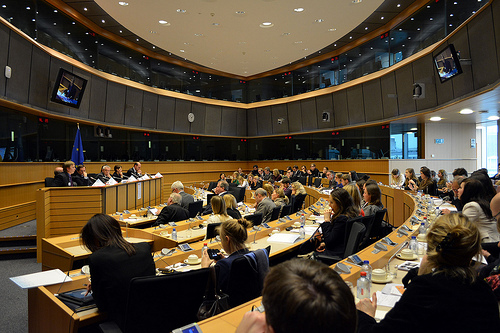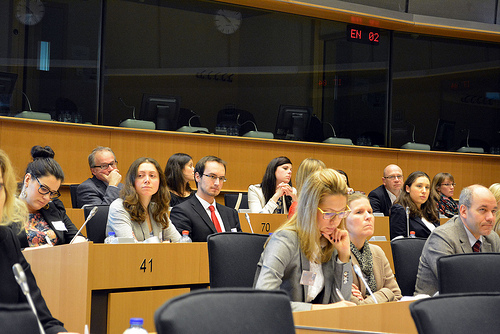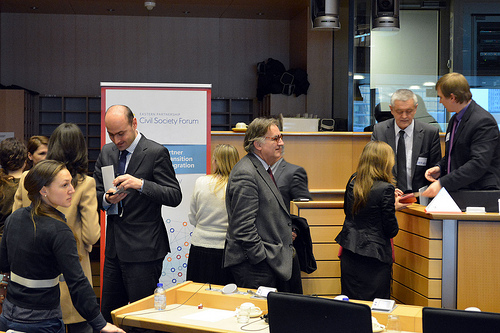|
IN THE SPOTLIGHT |
Eastern Partnership Civil Society Forum
|
|
EU Eastern Neighbours at the crossroads: CSF holds stakeholder event in the European ParliamentEU Eastern Neighbours at the crossroads – an event organised by the Eastern Partnership Civil Society Forum and the office of Jacek PROTASIEWICZ, Vice-President of European Parliament in the European Parliament in Brussels this week brought together EU policy-makers and civil society actors. The participants assessed the post-Vilnius situation in the eastern neighbourhood and looked for ways to solve geopolitical and policy dilemmas facing the neighbourhood, as well as assessed the role that civil society can play in the reform process.
In his welcome speech MEP Jerzy BUZEK stressed that the EU offer to the neighbourhood is extremely valuable – in the short-term, it is visa-free regime; energy market opening, and experience exchange; in the long-term, it is total transformation of the countries. Jerzy Buzek talked about the importance and the role of the civil society in respective EaP countries and expressed the support the EU is ready to give in commitment for the democratic reforms in the region. Natalia Yerashevich, Director of the Secretariat of the Eastern Partnership Civil Society Forum, drew attention to the human rights situation in Azerbaijan and arrest of Annar Mamadli, the head of the Election Monitoring and Democratic Studies Center (EMDS) in Azerbaijan on 16 December. The panellists included Arnoldas Pranckevičius, Adviser External Policies, Cabinet of the President, European Parliament, CSF representatives - Boris Navasardyan, Armenian National Platform, Vano Chkhikvadze, Georgian National Platform, Hennadiy Maksak, Working Group Coordinator on Economic integration and convergence with EU policies and prominent researchers on the EU intergration issues - Orysia Lutsevych, Chatham House, London, Nicu Popescu, EU Institute for Security Studies, Paris and Jan Pieklo – CSF Steering Committee member as a moderator.
Mr. Navasardyan voiced his concern over the alternative approximation process that is currently going on between Armenia and Russia and absence of coordination between the negotiation teams dealing with the EU and Russia. His main two questions are what space will be left for EU-Armenia relations after the negotiations with Russia are completed and how can three main political alliances in Europe influence their political partners in Armenia, who support closer integration with Russia. Mr Chkhikvadze stressed that there is a number of internal and external challenges to signing of the Association Agreement present in Georgia, including Russia’s leverage through the so-called “borderisation” process and remittances that Georgians working in Russia send back home, and the EU focusing on its internal issues. Mr Popescu believes that the reform process in Moldova will only become irreversible after signing the Association Agreement and that it is crucial to ratify the agreement before the next elections in Moldova (for example by cutting the time that is taken by translation) so that no matter who comes to power the reform scenario is already pre-determined.
Mr Pranckevičius regards Vilnius Summit as a success due to the fact that among some other achievements it served as a ‘wakeup call’ for the EU leaders. In the light of the recent events in Ukraine, Arnoldas Pranckevičius talked about a more strategic approach EU should perform when it comes to Eastern Partnership – as one of the ways to solve geopolitical and policy dilemmas facing the region. ‘It is clear that the relations with Russia now need to be revised’, he said to the audience. EU official believes that aspirations of the Ukrainian citizens should be met. Mrs Lutsevych warned that the EU should not make mistakes that Russia did engaging only with the elites. The role of civil society in the EaP and horizontal exchanges between the EaP countries and the EU should be increased. She talked about a value-based vision of EU external policies in the Eastern Neighbourhood, as compared to Russia approach of only offering ‘cash’ on the table. According to her, EU value-oriented approach towards the neighbourhood is the long-term vision aiming for success. Mr Maksak voiced the recommendations of the Steering Committee of the Eastern Partnership Civil Society Forum to the Ukrainian authorities:
as well as the EU:
In adress to the policy makers, the civil society participants invited to take into the account their voice and recommendations when constructing policies and the strategy in the Eastern Partnership region and recognise it as a way of engaging civil society's role in the EU regional policy making.
EaP CSF is thanking for the support of Jacek PROTASIEWICZ, Vice-President of the European Parliament and his office in organizing the event. |
Project funded by the European Union
![]()











